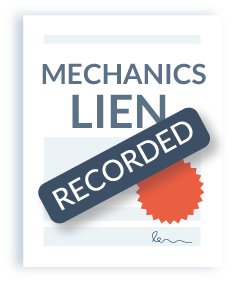
The right to file a mechanics liens is a statutory right. What this means is that a contractor typically doesn’t have those rights by default. Instead, they must strictly adhere to the statutory requirements in order to secure the right to file a mechanics lien. No promise or agreement can alter or extend these rules and deadlines. In a Massachusetts court case, a subcontractor lost their mechanics lien rights because they trusted the owner’s promise to pay. As a result, the subcontractor missed their deadline to enforce their lien.
Massachusetts mechanics lien process
A mechanics lien is the single most powerful tool for the construction industry to ensure you get paid what you’ve earned. Each state has its own particular set of requirements and deadlines to be protected under its lien laws. In Massachusetts, the mechanics lien process is a three step one.
The first step is to file a Notice of Contract/Subcontract. This should be done the earlier of either:
- 60 days after the filing Notice of Completion;
- 90 days after the filing of a Notice of Termination; or
- 90 days after the last furnishing of labor or materials to the project.
The second part of the process is filing a Statement of Account. This needs to be filed the earlier of either:
- 90 days after the Notice of Substantial Completion has been filed;
- 120 days after the Notice of Termination; or
- 120 days after the last furnishing of labor or materials to the project.
Lastly, in order to enforce your lien claim, a lawsuit must be initiated within 90 days of filing a Statement of Account.
Before you start any project (either in your state or in another) it’s crucial to familiarize yourself with the lien laws to ensure that your rights to payment are properly protected. When going through the mechanics lien process, there are strict deadlines that must be met, regardless of any promises to pay. A Massachusetts subcontractor learned this lesson the hard way.
Learn more: How to File a Massachusetts Mechanics Lien | A Practical Guide
Subcontractor’s lien rights expire due to a promise to pay
The case in question is D5 Iron Works, Inc. v. Danvers Fish & Game Club, Inc.
Project Snapshot:
- Owner: Danvers Fish & Game Club, Inc. (Danvers)
- General Contractor: Patriot Range Technologies, Inc. (Patriot)
- Subcontractor: D5 Iron Works, Inc. (D5)
Danvers, a shooting range in Massachusetts, hired Patriot as the general contractor to perform some construction work. Patriot then hired D5 to fabricate and install steel components for the improvement.
Upon completion of their work, D5 submitted their final invoice for payment, totaling around $196,500. Ultimately, Patriot never paid the invoice.
Owner promises to pay the sub
DFG, the property owner, was aware of payment issues on the project. They notified the subcontractor that they intended on paying them in full for all of their work. Although this eased D5’s concerns, they still filed a Notice of Subcontract and a Statement of Account in April, “in case things didn’t pan out.”
Later that month, DFG again contacted the subcontractor to reassure them that they would pay D5 in full. Subsequently, D5 decided not to pursue their lien through an enforcement action based on the statements made by DFG. Based on these promises, D5 allowed their enforcement deadline to pass.
However, DFG reneged on their payment promise after the enforcement deadline passed, and declined to pay. D5 attempted to resurrect their mechanics lien rights by filing another Notice of Contract and Statement of Account, and filed an enforcement action.
At trial, the court granted DFG’s motion for summary judgment based on the fact that the time to enforce the original lien claim had already lapsed. D5 appealed.
Court rules that the enforcement deadline had passed
On appeal, the court focused on the fact that mechanics lien statutes must be strictly construed against the person claiming the lien. Under Massachusetts law, a mechanics lien will be dissolved unless the claimant commences a civil action to enforce within ninety days after the filing of the statement.
Furthermore, there can only be one lien that is based on the provision of labor and materials. Filing a second claim will not revive any expired lien rights, or extend any deadlines.
In response to D5’s argument that they relied on the statements made by DFG promising to pay, the court cited a previous case dealing with a similar issue. It stated that “reluctance to ruffle anyone’s feathers by early notification, however understandable or common in the industry, it does not change the plain meaning of the statute.” Accordingly, the appeals court upheld the trial court decision.
As a result, the subcontractor (D5) lost their lien claim.
Contractors should pursue payment, not promises
Although this was a Massachusetts case, the lessons learned here apply no matter where you’re working. Courts enforce statutory deadlines strictly. There are no oral arrangements or contractual agreements that can modify or extend these deadlines.
Contractors, subs, and suppliers alike should ensure that they familiarize themselves with the mechanics lien requirements and deadlines of any state they pursue work in. If you’re having payment problems on a job, be sure to secure and, if necessary, enforce your mechanics lien rights.
To learn about the mechanics lien laws in your state, choose your state in the Construction Payment & Lien Law Learning Center.

